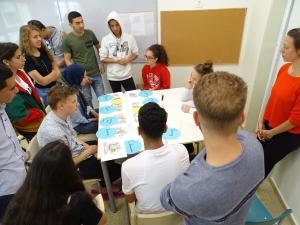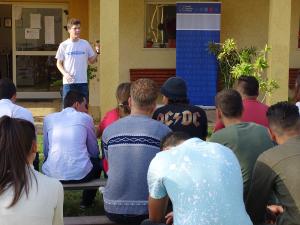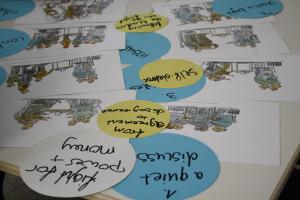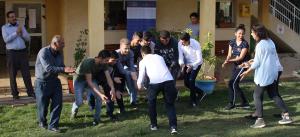YOCOPAS Seminar - Foundation Office Israel
Event Reports
The opening ceremony started with a musical piece played on piano by one of the EMIS students as well as by opening words by the organizing students committee. Then spoke Dr. Nedal Jayousi who expressed his belief that the only way of solving the conflict is through dialogue and sitting together. Principal, Gili Roman, encouraged the students to volunteer in the organization of the YOCOPAS conference and greeted the speakers from Germany and Spain.
Over 40 students participated and began their sessions by splitting into three groups. Aranzazu Flores Romero led the workshops and lectured about intra-state conflict in multi-ethnic states. She described the reality after the cold war, when conflicts between different ethnic groups erupted throughout the world and gave several of examples. She differentiated between conflicts within democratic states, where freedom of protest and expression are allowed, and non-democratic states, where conflicts are suppressed. At last the whole group defined together the terms of state and conflict.
Simultaneously, Dagmar Nolden led a workshop about methods and tools of conflict resolution. She defined what a conflict is and asked what are the feelings and results that derived from it. She stressed that we cannot avoid conflicts but only learn how to deal with them. The students were then split into groups and had to order a set of pictures, which portray the chronicles of a conflict, in a meaningful way, to give each picture a title and decide where a third-party involvement could be helpful. Finally the groups discussed the steps and development of conflicts, their turning points and third-party involvement.
The third simultaneous workshop was run by EMIS students and dealt with ethical and political questions, such as: one life worth less than 10 people’s lives, money=happiness, no war means peace, forgiving and forgetting is possible etc. The students had to agree or disagree with each statement and to explain their decision so that the other students will be convinced too. Then the statements became more conflict-related such as: if the conflict ends I can forgive and forget, my side wants peace, nationalism is dangerous, violence is sometimes justified etc. Again, the students had to choose a side and persuade the other students in their opinion. In the end the students had to opportunity to ask the entire group for their opinion on a certain statement.
After lunch, the groups moved to another workshop and after another break they changed their place again so every participant has eventually attended all three workshops. After the Palestinian participants preformed a traditional Dabke dance, the students were given free time to prepare themselves for dinner. In the evening the whole seminar gathered at the dining hall and watched the festive Friday evening ceremony. Then they had dinner altogether. Afterwards they could watch together a movie and dance together at the party.
On the second day, after breakfast the participants were divided into two groups. One group attended the workshop of Aranzazu Flores Romero, where they learned how to analyze the Israeli-Palestinian conflict in few steps: Stopping and thinking about it, looking at oneself, what works what does not work? How can I improve my position? Comparing to other conflicts, looking around in the region and beyond for support, elaborate an action plan and look for allies. The participants then split into groups and identified domestic, regional and international obstacles for their plan and proposed solutions.
At the same time, the second group attended the workshop of Dagmar Nolden. She asked the participants to imagine that they are on a desert island and they want to get out of there. There is one engineer and one doctor. The rest are sick and need to get a treatment. The engineer and the doctor have found a tree that can either help them build a ship to escape the island or cure the sick people on the island. The engineer is in favor of building a ship and the doctors wishes to cure the people. The group was divided into groups of a doctor and an engineer who had to find a settlement for the dilemma. This was a simulation of conflicting interests from which the groups had to find ways of resolution. Afterwards, Dagmar Nolden elaborated on different approached for conflict-resolution such as: avoidance, accommodation, competition, collaboration, compromise.
After a break the two groups exchanged the workshops, then they had lunch and before they all went home they filled evaluation forms and attended the closing ceremony which reflected on the whole two days together.






